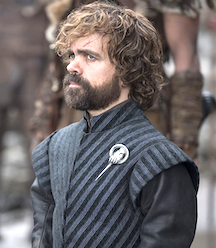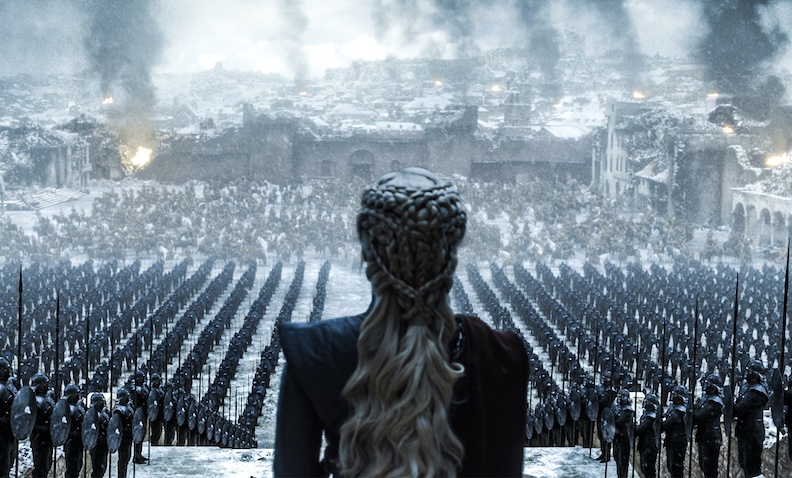Ten years ago, when HBO debut its new fantasy series based on the books from author George R.R. Martin, I was not a regular viewer. I didn’t have HBO. It’s possible I didn’t even have cable at the time, though I’ve been through so many different phases of having or not having cable, I don’t remember which is which any more. I never did get on the Game of Thrones bandwagon, though I learned a lot about the show through cultural osmosis. It would be impossible not to, really, since it was a phenomenon for most of its time on the air.
I had heard a lot about the King in the North and the Mother of Dragons and the Red Wedding, though I didn’t have the context to understand what people were talking about. I always intended to watch the show once it had ended and finally, this past January, my wife turned to me and said, “Why don’t we start watching GAME OF THRONES?”
Honestly, I’m glad I waited to watch the show after it ended. I don’t think I would have enjoyed the show nearly as much as I did. Judging by the IMDb rankings for the final season episodes, it seems like a lot of people felt the same way.

Of course, the HBO series is amazing. It is groundbreaking and compelling and sucks you in from the very first episode, when Jaime Lannister pushes young Bran Stark out a window to protect the knowledge that he was having sex with his twin sister Cersei, who was married to King Robert Baratheon. You wouldn’t think a show could top that particular sentence, but Game of Thrones continued to outdo itself, season after season, as it built out the world of Westeros and adapted author George R.R. Martin’s work to the small screen.
The world building is Game of Thrones’ biggest strength, because it gave the showrunners a chance to switch the focus to another part of the world to keep viewers from getting bored. The various houses of Westeros each got a spotlight in the first 5 or 6 seasons, as the different families positioned themselves for a final major battle to sit atop the Iron Throne in the Westerosi capital of King’s Landing.
That strength, though, is what eventually brought the show down in the eyes of fans. After spending so much time introducing new lands and major players throughout the world, Game of Thrones eventually had to rein that in and bring everything to together. Yes, the show stopped being an adaptation in the final seasons because it had outpaced George R.R. Martin’s novels, but the bigger drawback in the final seasons was the loss of so many of the characters to death and dismemberment. Eventually, when a show is clearly building to a final war to name one character as the ruler of the Seven Kingdoms, the world building has to stop and the story has to get a little smaller. It changes the feel of the show and everything gets a little more claustrophobic.
Another weakness of the final season was that by the show’s final six episodes, I no longer had any characters whose death I was looking forward to. Yes, of course, we knew the Night King – the leader of the zombie hordes from beyond the northern wall – was a big threat, but we also knew he was going to meet his end. But I had spent seven seasons anticipating the deaths of certain characters, with a great payoff when they were finally shuffled off their mortal coil. Much like Arya Stark, I had my own list of people I wanted to see die: King Joffrey, Stannis Baratheon, Walder Frey, Ramsey Bolton and Petyr Baelish.
All of those people met their end at various points of the series, culminating with the death of Baelish at the end of season 7 when Sansa and Arya Stark realized he had been playing both sides against the middle and tried him for treason in the court of Winterfell. Once Baelish died, there was no one else whose death I was particularly looking forward to, and the character deaths were a big part of the Game of Thrones narrative. Maybe if they had saved Baelish’s death for some time in the eighth and final season, there would have been a little bit more catharsis for the ending. But as it ended up, I didn’t have a particularly strong rooting interest in the death of anyone in the final six episodes.
I don’t think the final season of the show was anywhere near as bad as many others, who have spent the last two years ripping it apart. The story built naturally, if a little rushed in a 6-episode eighth season, and I do believe the characters stayed true to the versions that had been built out on the show. The end result of Daenerys Targaryen going mad with power and destroying King’s Landing was predictable given the character’s arc yet still managed to be shocking in its brutality. The Mother of Dragons had an obsession with not only returning her family to the Iron Throne but to also be loved by the people of Westeros when she ascended. As it became clear to her that, even if she became Queen of the Seven Kingdoms, she would never have the love of the people she ruled, the frightening parts of her nature came loose.
There were hints throughout the series that Daenerys wasn’t the altruist savior that her followers made her out to be. Each shocking act she committed on her way to declaring war on King’s Landing led her to her final, terrible act, though her earlier sins were washed away by the explanation that she was only doing terrible things to terrible people. Dany’s final fate was as necessary as that of her father, the Mad King, who was murdered by Jaime Lannister before the series started after he took to burning his subjects alive.
From the first episode, I thought it would be clear that Jaime Lannister would be one of the main villains of the series. After all, he crippled a young boy while committing incest with his twin sister. He had to be a terrible human being! But I wasn’t far into the series when I found myself rooting for Jaime as he continued a weird redemption story after he promised to keep the Stark daughters safe and his even more weird flirtation with Brienne of Tarth. By the final season, after the penultimate battle of the series, I loved watching scenes with Jaime and his dwarf brother and the odd friendship they had both developed with mercenary-for-hire Bronn. And it broke my heart a little bit when he left Brienne to return to his sister in King’s Landing, though there’s a beautiful symmetry to the way their story started and ended together.

Speaking of Jaime’s dwarf brother, Tyrion Lannister was by far the best part of the show for most of Game of Thrones’ run. The mesmerizing character, played by Peter Dinklage, could have been little more than a sad farce. But Dinklage took the role seriously and made Tyrion into the heart of the series. The youngest Lannister heir was brilliant, quick-witted and desperate to find people he could trust or believe in. Once the series focus shifted away from his machinations to his quest to get Daenerys on the Iron Throne, the series suffered a little bit. Tyrion Lannister had finally found someone he could believe in, and it eventually broke him, because even she eventually let him down, like many of the women in his life had.
One of my oft-repeated lines to my wife about Game of Thrones, as we took about four and a half months to watch the whole series, was “The women on this show are terrifying.” Every single main female character – and quite a few of the women in supporting roles – would frequently outsmart their male counterparts or just commit an act so terrible that it made me shudder. Daenerys crucified slave traders; Cersei Lannister blew up a temple with her daughter-in-law, the Queen, inside just to defeat the religious sect that had overtaken King’s Landing; Brienne of Tarth proved herself to be the fiercest fighter in all of Westeros, until she came up against Arya Stark, who killed the Night King after leaping at him out of nowhere; Olenna Tyrell admitted to poisoning King Joeffrey to protect her granddaughter after she downed poison herself; even Lyanna Mormont, the way-too-young Lady of Bear Island, backed up her stone-cold demeanor by killing a zombie giant in the penultimate battle.
Game of Thrones never once portrayed the women of Westeros as damsels in distress. If anything, the men of Westeros were all-too-easily outmatched by their better halves.
I can see where people may have been disappointed in the final season if they started watching the show back in 2011 and followed it religiously up until its finale two years ago. With so much time in between seasons, and especially once the show veered away completely from being an adaptation, the imagination of fans goes far and wide, dreaming up any number of scenarios for how they would take down the Night King or who would eventually sit atop the Iron Throne. While Arya’s defeat of the Night King was pretty well telegraphed – even though people expected it to be Jon Snow – I’m not sure anyone would have called Bran Stark ruling as the Broken King.
Maybe the final season could have been an extra couple of episodes to help the pacing of the story’s final chapter, but ultimately, I thought season 8 worked exactly because endings sometimes come faster than we’re comfortable with and life is forced to move on. Pretty much every aspect of the entire series worked for me and I really loved the whole thing. I can very much see myself watching the series again to try and catch things I may have missed the first time through, and I imagine that’ll happen at some point in the next year. And I even find myself a little excited for the handful of Game of Thrones spin-offs HBO has in the works.
But for now, our watch has ended. And it was totally worth it.
